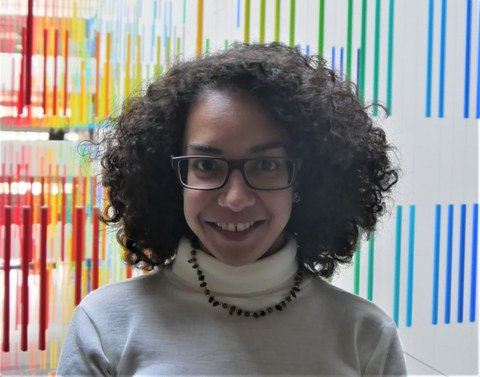Feb 04, 2022
Humboldt Fellow Develops Electrochemical Sensors for the Early Detection of Kidney Diseases
Humboldt Research Fellow Dr. Maria Rita Ortega Vega from the Universidade Federal do Rio Grande do Sul in Brazil will be a guest at the Faculty of Chemistry and Food Chemistry at TU Dresden. Here, she will work together with her host Prof. Stefan Kaskel on the development of novel electrochemical sensors for the salivary detection of kidney diseases.
The kidneys are vital organs that clean the blood and influence many bodily functions. Many kidney diseases initially show neither pain nor symptoms. Often, it is only as a result of a random examination that proteins or only microscopically visible traces of blood in the urine indicate damage to the kidney.
The Brazilian material scientist Dr. Maria Rita Ortega Vega would like to develop a completely new method for the early detection of kidney disease at the Technische Universität Dresden. To this end, she is collaborating with host Prof. Stefan Kaskel and his team as part of a Humboldt research stay. Kaskel is a professor of inorganic chemistry and is particularly involved in research into porous materials, e.g. for the energy transition or for environmental technologies. However, Dr. Ortega Vega wants to use these materials in her project "Nanostructured transition metal-based electrochemical sensor for salivary urea detection for kidney failure diagnostics" to detect and quantify urea in saliva using electrochemical techniques.
"The presence and amount of urea in saliva can be an indicator of kidney problems. With such a sensor, patients and doctors can get reliable results quickly and without blood testing. For patients who are already in the chronic stage of the disease, this technology can help evaluate the performance of the dialysis process. We expect to jointly develop a specific and sensitive material for this application," explains Maria Rita Ortega Vega.
"I am delighted that we have been able to attract Ms. Ortega, a talented young scientist who is an excellent fit for our team, to TU Dresden. Her innovative research into new topics in biosensorics will certainly benefit decisively from the excellent research environment in Dresden," states Prof. Kaskel.
As a Henriette Heart Scout of the Alexander von Humboldt Foundation, he has the opportunity to identify three excellent and highly sought-after young scientists from abroad, to propose them for a Humboldt Research Fellowship and to bring them to the TU Dresden. Maria Rita Ortega Vega is the first fellow Kaskel has been able to recruit for his team in this way.
"I liked the level of work of the team: there are many promising developments here with great opportunities for technology transfer and applicability. This is very important to me: doing science that can have an impact on society. I consider science as a democratic project, so studying systems and materials that are scalable to make them reach people by means of different applications and that can make life easier, “materializing” knowledge, is a huge motivation. I also liked the infrastructure, which is very different from the one in Brazil. TUD has different technologies and equipment that I am not used to and I'm looking forward to learning about them," Maria Rita says about her motivation to accept Stefan Kaskel's invitation to Dresden.
Media inquiries:
Dr. Maria Rita Ortega Vega
Inorganic Chemistry I
Email:

